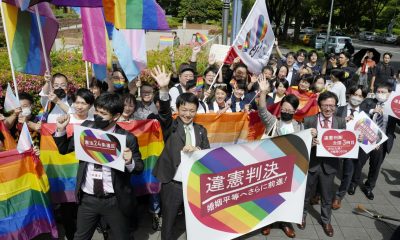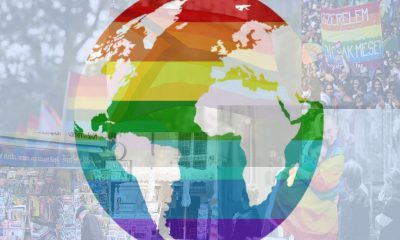World
Out in the World: LGBTQ+ news from Europe & Asia
LGBTQ+ news stories from around the globe including the United Kingdom, Ireland, Liechtenstein, Japan & Thailand

UNITED KINGDOM
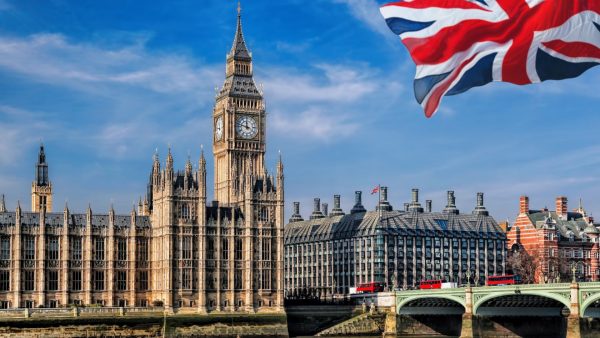
By Erin Reed | LONDON, UK – Following a recent decision in England by the National Health Service to stop prescribing puberty blockers for transgender youth, former U.K. Prime Minister Liz Truss introduced a bill that would outlaw gender-affirming care for trans youth. The bill would also eliminate any recognition of social transition and would define sex to exclude transgender individuals in the Equality Act. Currently, transgender youth can still access gender-affirming care through private clinics. However, Truss’s bill ran into trouble on Friday when, instead of being debated, Members of Parliament spent hours deliberating over ferrets and pet names, exhausting the available time and preventing the bill from being heard.
As of this week, the National Health Service in England has declared that it will no longer permit transgender youth to receive puberty blockers for gender dysphoria. Although the announcement sparked significant public backlash, its practical impact was somewhat mitigated by the extreme waitlist for care, which exceeds five years. Only a hundred transgender youth had been prescribed blockers of the thousands waiting for an appointment. Importantly, the decision does not affect care through clinical research trials and does not affect private clinics—a route many parents had already pursued due to the surging wait times at the limited number of NHS clinics providing care.
Former Prime Minister Liz Truss introduced a bill aimed at curbing that latter route of obtaining care. The proposed legislation would criminalize the prescription of gender-affirming care to transgender youth. It seeks to prevent “the recognition of gender inconsistency in children,” which is defined as “referring to a child with language that is inconsistent with their sex” and “treating a child in a manner that is inconsistent with their sex.” However, the bill does not specify how boys and girls should be treated in accordance with the law. Additionally, it proposes amendments to the Equality Act to define sex to exclude transgender individuals and end protections in bathrooms and other similar spaces.
See these lines from the bill here:

However, when the time arrived to debate bills, Members of Parliament diverted their attention to hours of discussions about ferrets and pet animal names within the context of an animal welfare bill. In one notable interaction, Labour MP Sarah Champion addressed Labour MP Maria Eagle, remarking humorously on the frequent mentions of ferrets:
MP Champion: “I am very interested in my honorable friend’s, well, key mention of ferrets at every opportunity in this debate. I’d like to put on record that my brother had a ferret called Oscar.”
(Laughter)
MP Eagle: “Well she has that now on the record. I don’t know really what else to say about that except that I’m sure that Oscar brought her brother great joy, and that’s what pets do, and I’m sure there are many other ferret owners who might attest to the same thing.”
You can watch the exchange here:
In another exchange, even some conservatives appeared to be in on it, such as Mark Spencer, who spoke at length listing off of many pets that had been named and put on the record.
MP Mark Spencer: “I am confident that Members of all parties will agree that animals have been of great support to individuals and families, particularly during covid-19, when my pets were certainly of great support to me. Pets often help to keep people sane when they are under pressure in their everyday pursuits, so it would be remiss of me not to put on the record the names of my three dogs, Tessa, Barney and Maisie, and the name of my cat, Parsnip. There has been a proud tradition this morning of mentioning various pets, including: Harry, George, Henry, Bruce, Snowy, Maisie, Scamp, Becky 1, Becky 2, Tiny, Tilly, Pippin, Kenneth, Roger, Poppy, Juno, Lucky, Lulu, Brooke, Lucy, Marcus and Toby, who are the dogs; and not forgetting Perdita, Nala, Colin, who is sadly no longer with us, Frank, two Smudges, Attlee, Orna, Hetty, Stanley, Mia Cat, Sue, Sulekha, Cassio, Othello, Clapton, Tigger, who is sadly no longer with us, and Pixie, who are the cats.”
The lengthy exchanges on pet names and ferrets ran the time out, and as such, the bill targeting transgender people could not be heard. The lengthy discussion, which has since been referred to as a filibuster, echoes filibusters that have occurred in the United States to kill similar legislation, including recently in West Virginia on a bill that also would have defined sex in an identical way.
The exchanges provided a ray of hope for trans residents in England, which has been beset by anti-trans politics in recent years. Likewise, it was a sign that the Labour Party, which has previously been seen as “backsliding” on transgender rights, has not completely abandoned its transgender constituents. Though the bill is not officially dead, it has been placed at the bottom of the priority list for March 22nd, meaning it almost certainly will not be debated, with government sources calling the bill “unworkable.”
For those who advocate for transgender rights, however, the ferret has become “an overnight symbol of trans resistance” and a sign that anti-trans politics may be reaching their limit even in the United Kingdom.
IRELAND
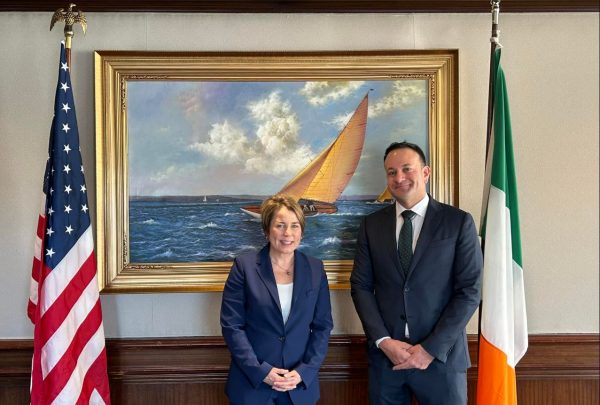
By Rob Salerno | DUBLIN, Ireland – The Irish people delivered a major rebuke to the political establishment by voting overwhelmingly against a pair of constitutional referendums that had been endorsed by all parties which would have amended language in the constitution that says a woman’s place is in the home, and that families are based on marriage.
The government had held the referendum on International Women’s Day, March 8, in a symbolic move, and turnout was measured at 44.4%. Results were announced the following day.
Ireland’s openly gay prime minister Leo Varadkar accepted defeat Saturday.
“It was our responsibility to convince the majority of people to vote ‘yes’ and we clearly failed to do so,” Varadkar said.
The first question, which was defeated 67% to 33%, asked voters to add the words “whether founded on marriage or on other durable relationships,” to the constitution’s definition of “family,” in order to be more inclusive of diverse family types.
The second question, which was defeated by a similar margin, as voters to delete a clause that says “the State recognises that by her life within the home, woman gives to the State a support without which the common good cannot be achieved. The State shall, therefore, endeavour to ensure that mothers shall not be obliged by economic necessity to engage in labour to the neglect of their duties in the home.”
Critics say the language promotes sexist gender stereotypes. The revised language would have used gender-neutral language to recognize “the provision of care, by members of a family to one another.”
Advocacy group LGBTQ Ireland had called for people to vote “yes” to both referendums, “so all children and families, including LGBTQ families, are recognised equally in the Constitution.”
But a persuasive “no” campaign had arisen that alleged the revision would have struck women’s privileges and rights. Forces aligned against the referendum included some progressive and feminist groups that alleged the proposed language was unclear and lacked consultation.
Irish voters have in recent years approved a number of progressive reforms to their constitution, including streamlining the divorce process in 2019, legalizing abortion and decriminalizing blasphemy in 2018, and legalizing same-sex marriage in 2015.
LIECHTENSTEIN

(Photo Credit: Principality of Liechtenstein)
By Rob Salerno | VADUZ, Liechtenstein – The tiny principality of Liechtenstein got one step closer to full equality for LGBTQ people as its parliament approved a bill to legalize same-sex marriage with a 24-1 vote, bringing a years-long process nearly to a close.
Local LGBTQ advocacy group FLAY expressed gratitude to members of Landtag, the Liechtenstein parliament, for advancing the law last week.
“Thank you for 24x ‘yes’ in the Landtag,” the group posted to its Facebook page.
“FLay the association for the queer community in Liechtenstein is very happy that 24 out of 25 deputies in parliament voted in favour on today’s first reading.
Keeping in mind the completely blocked situation only 3 years ago, the denial of our government for participating any public discussion, we can be more than proud and happy on our successful steps towards the legitimation of the civil marriage for all,” Stefan Marxer, a FLay board member told the Blade in an email.
The marriage bill is expected to pass second reading before the summer parliamentary break, and come into effect by January 1, 2025, unless a referendum is called on the issue.
The tiny country of about 40,000 people, about the size of Washington, D.C., has made major progress on advancing LGBTQ rights in the last decade, though the International Gay and Lesbian Association-Europe ranked the country 38th among 49 European countries in its annual survey of LGBTQ rights on the continent last year.
Liechtenstein has allowed same-sex couples to form registered partnerships with limited rights since 2011. The registered partnership law was subject to a referendum after gay rights opponents collected more than 1,000 signatures demanding it. The law was approved by voters 69% to 31%.
A same-sex couple had sued the state seeking the right to marriage in 2017, but ultimately lost when the state court ruled that the ban on same-sex marriage was not unconstitutional. However, the court did find that the law banning same-sex couples from adopting was unconstitutional and ordered the country to amend the law. It eventually did so last year.
Discussion of marriage equality began in earnest in Liechtenstein after neighboring Switzerland passed its same-sex marriage law in its parliament in 2020.
One obstacle was the Prince, who wields significant executive authority in Liechtenstein compared to other European monarchies. In 2021, Prince Hans-Adam II said that while he supported same-sex marriage, he would not support adoption rights. That obstacle seemed to disappear when the state court ordered the government to legalize full adoption rights. By 2022, Hans-Adam’s son Alois, who governs as regent, told a magazine that same-sex marriage was “not a problem.”
The Catholic Church had also intervened, with the former Archbishop of Liechtenstein Wolfgang Haas leading a campaign against the bill and cancelling a traditional service at the opening of last year’s Parliament in protest. Haas retired last autumn.
Despite broad agreement among legislators, the same-sex marriage law has taken a slow path through Parliament. In November 2022, Parliament voted 23-2 asking the government to bring forward a same-sex marriage bill. The government held a three-month-long public consultation on same-sex marriage last year before putting the bill on the agenda for Parliament’s March 2024 meeting.
Under the marriage bill, the country will stop registering new partnerships, and people in partnerships will have the option of converting them to marriages or keeping them as they are. All other rights will be equalized.
Liechtenstein is the last German-speaking country to legalize same-sex marriage. Around the world, 37 countries have legalized same-sex marriage, including 21 countries in Europe. The most recent country to legalize same-sex marriage is Greece, and Thailand is expected to pass a same-sex marriage law later this year.
JAPAN
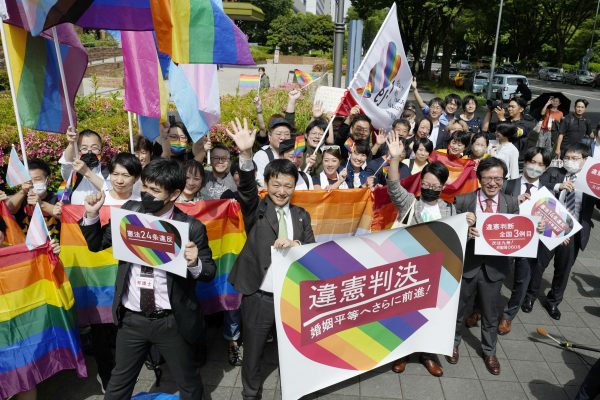
By Rob Salerno | TOKYO, Japan – Two courts ruled on this past Thursday that Japan’s ban on same-sex marriage is unconstitutional, increasing pressure on the government to legalize it.
District courts have been weighing same-sex marriage since several coordinated cases were filed across the country in 2019. Along with Thursday’s ruling from the Tokyo District Court, five district courts have ruled that the ban on same-sex marriage was unconstitutional, while one court has upheld the ban. A seventh district court case was filed last month.
But on Thursday, the Sapporo High Court delivered the first ruling on same-sex marriage at the appellate level, and same-sex couples won there, too.
So far, all courts have dismissed claims for monetary compensation.
It’s likely that all of the cases will end up at the Supreme Court.
In a statement released after the ruling, the plaintiffs’ lawyers called on the government to act swiftly to protect their rights.
“I would like to reiterate that this shows that there is no time left for legal reform. The government should take seriously this judgment that found this provision to be unconstitutional… and promptly amend the law to allow marriage between same-sex couples,” the statement says.
Under Japan’s legal system, courts rarely invalidate or amend laws that are ruled unconstitutional, leaving that to the legislature.
But Japan’s national government has long been cold to LGBTQ rights. Last year, queer activists had hoped that the government would finally pass a long-demanded anti-discrimination bill, but by the time it was put before the legislature, it had been watered down to a bill that only calls on the government to promote understanding of LGBTQ people.
At the local level, queer activists have seen greater success. Twenty-nine of Japan’s forty-seven prefectures, as well as hundreds of municipalities, have enacted partnership registries for same-sex couples that at least afford some limited rights.
THAILAND
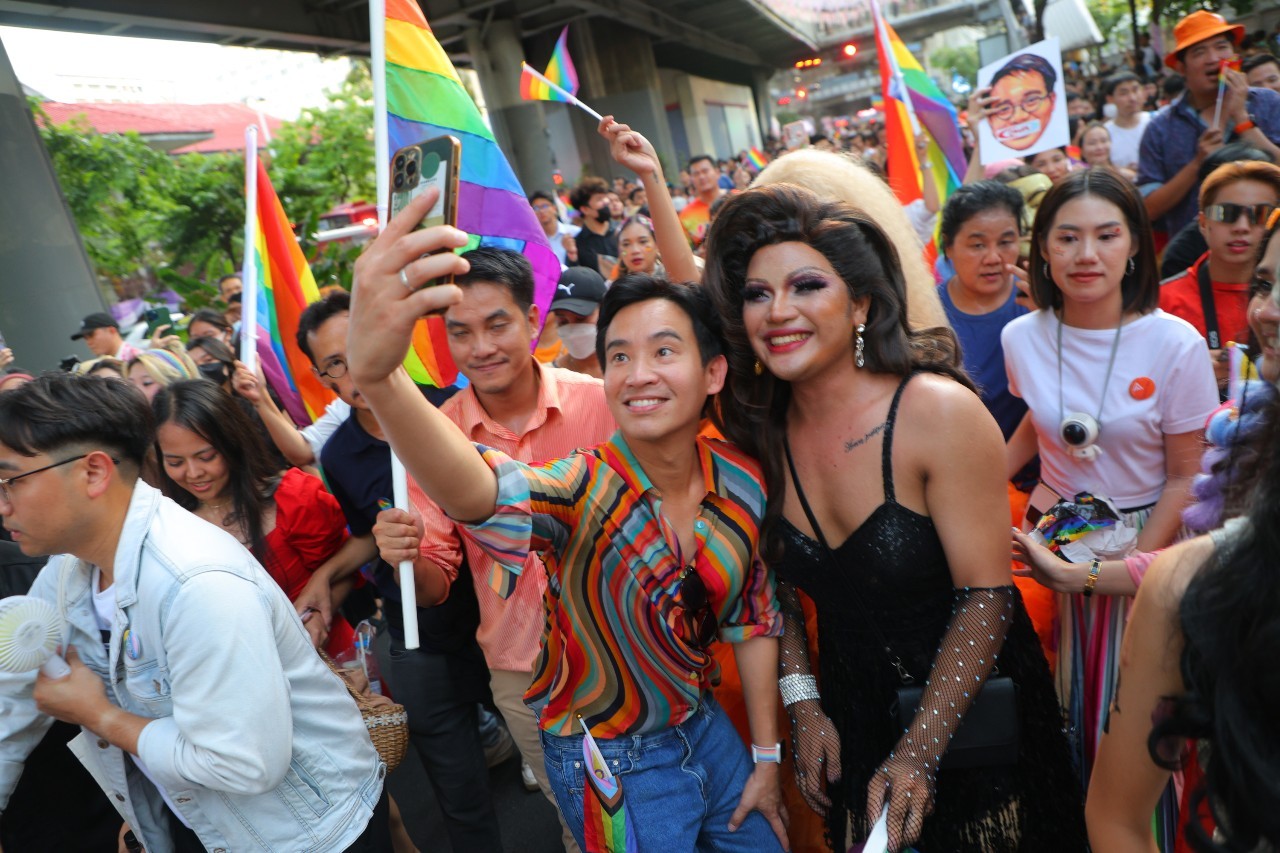
By Rob Salerno | BANGKOK, Thailand – Same-sex marriage could soon be a reality in the Southeast Asian country, as a bill to legalize cleared its first test in the legislature Thursday.
A committee set up by the House of Representatives to examine the bill approved it, setting it up for a final vote in the House on March 27. After that, it will need to be approved by the Senate, which is dominated by appointees of the former military junta that ruled the country until 2017. It is expected that the bill will pass into law by the end of the year.
The proposed bill gives same-sex couples equal rights to married heterosexual couples, including in inheritance, tax rights, and adoption.
Same-sex marriage and LGBTQ rights generally have become a major political issue in Thailand in recent years, with queer people becoming increasingly visible and demanding greater equality.
Parties promising to legalize same-sex marriage and promote LGBTQ rights were the major victors of last year’s election, although the leading party was controversially disqualified from forming a government due to its support for reforming laws that penalize disparaging the monarchy, which was deemed unconstitutional. Nevertheless, the parties that formed government agreed to pass a same-sex marriage law, and last December, the house voted overwhelmingly to approve in principle a series of draft marriage bills.
The new government has also signaled that it will soon introduce a bill to facilitate legal gender change for trans people, and has begun a campaign to provide free HIV medication as an effort to eliminate HIV transmission by 2030.
Reporting by Erin Reed and Rob Salerno
India
LGBTQ+ poets included in India’s premier literary festival
Sahitya Akademi seen as mirror of government’s cultural agenda

India’s premier literary institution on March 7 announced it would allow LGBTQ+ poets to participate in its marquee Festival of Letters in New Delhi.
The Sahitya Akademi, often seen as a mirror of the government’s cultural agenda, for the first time allowed these poets into a high-profile poetry reading at the Rabindra Bhavan. They shared the stage with more than 700 writers across 50 languages.
Culture and Tourism Minister Gajendra Singh Shekhawat kicked off the Festival of Letters with Mahesh Dattani, the acclaimed English-language playwright famed for his provocative works, as the main guest. Dubbed Asia’s grandest literary gathering, the Sahitya Akademi took place over six days under the “Indian Literary Traditions” theme.
The 2025 Festival of Letters showcased a sweeping range of voices — young writers, women writers, Dalit authors from marginalized castes, Northeast Indian scribes, tribal poets, and LGBTQ+ poets — cementing its reputation as a literary kaleidoscope.
Kalki Subramaniam, a leading transgender rights activist and author, on March 9 chaired a literary session titled “Discussion on Literary Works of LGBTQ Writers in the 21st Century,” which spotlighted contemporary queer voices.
“It was enriching to listen to the profound thoughts of LGBT writers from various parts of the country in their speeches,” said Subramaniam. “The session was particularly memorable with the participation of A. Revathi Amma from Tamil Nadu, Reshma Prasad from Bihar, Sanjana Simon from New Delhi, and Devika Devendra Manglamukhi and Shivin from Uttar Pradesh and Aksaya K Rath from Orissa.”
Subramaniam discussed how global politics shape gender rights and the persistent erasure of trans identity, urging a unified push for solidarity within the LGBTQ+ community. She stressed the vital need to elevate queer works and writers, casting their voices as essential to the literary vanguard.
“It was a pleasure to meet great writers from around the country in the festival as well as meet my writer activist friends Sajana Simon and Revathi Amma after a long time,” said Subramaniam.

The government on March 12, 1954, formally established the Sahitya Akademi. A government resolution outlined its mission as a national entity tasked with advancing Indian literature and upholding rigorous literary standards; a mandate it has pursued for seven decades.
The Sahitya Akademi in 2018 broke ground in Kolkata, hosting the country’s first exclusive gathering of trans writers, a landmark nod to queer voices in Indian literature.
Hoshang Dinshaw Merchant, India’s pioneering openly gay poet and a leading voice in the nation’s gay liberation movement, on March 9 recited a poem at the Festival of Letters, his verses carrying the weight of his decades-long quest for queer recognition. He later thanked the session’s chair for welcoming the community, a gesture that underscored the event’s third day embrace of diverse voices.
The Sahitya Akademi in 2024 honored K. Vaishali with the Yuva Puraskar for her memoir “Homeless: Growing Up Lesbian and Dyslexic in India,” a raw account of navigating queerness and neurodivergence. Vaishali in a post-win interview reflected on India’s deep-seated conservatism around sexuality, noting she wrote from a place of relative safety — an upper-caste privilege that shielded her as she bared her truth. The award, she said, was the Akademi’s indelible seal on her lived experience, a validation no one could challenge.
The Sahitya Akademi’s inclusion of LGBTQ+ writers in its main program this year jars with the Bharatiya Janata Party-led government’s conservative stance, which, in 2023, opposed same-sex marriage in the Supreme Court, arguing it erodes Indian family values. Yet, under Shekhawat, the Sahitya Akademi’s spotlight on queer voices at the Rabindra Bhavan suggests it could be a tentative crack in a regime typically rooted in tradition.
The Festival of Letters hosted a translators’ meeting on March 10, spotlighting P. Vimala’s 2024 award-winning Tamil translation of Nalini Jameela’s “Autobiography of a Sex Worker,” a work steeped in marginalized voices that include queer perspectives.
This platform gained significant support from the BJP-led government, with Shekhawat securing a 15 percent budget increase to ₹47 crore ($5.63 million) in 2024. In Tamil Nadu state, however, Dravida Munnetra Kazhagam’s Chief Minister Muthuvel Karunanidhi Stalin, has long opposed such cross-linguistic efforts, fearing dilution of Tamil identity amid decades of anti-Hindi sentiment — a tension the Sahitya Akademi’s inclusive showcase sought to bypass.
‘The Akademi is very inclusive and has a friendly festival ambience,” Subramaniam told the Los Angeles Blade.
Japan
Japan’s marriage equality movement gains steam
Nagoya High Court this month ruled lack of legal recognition is unconstitutional
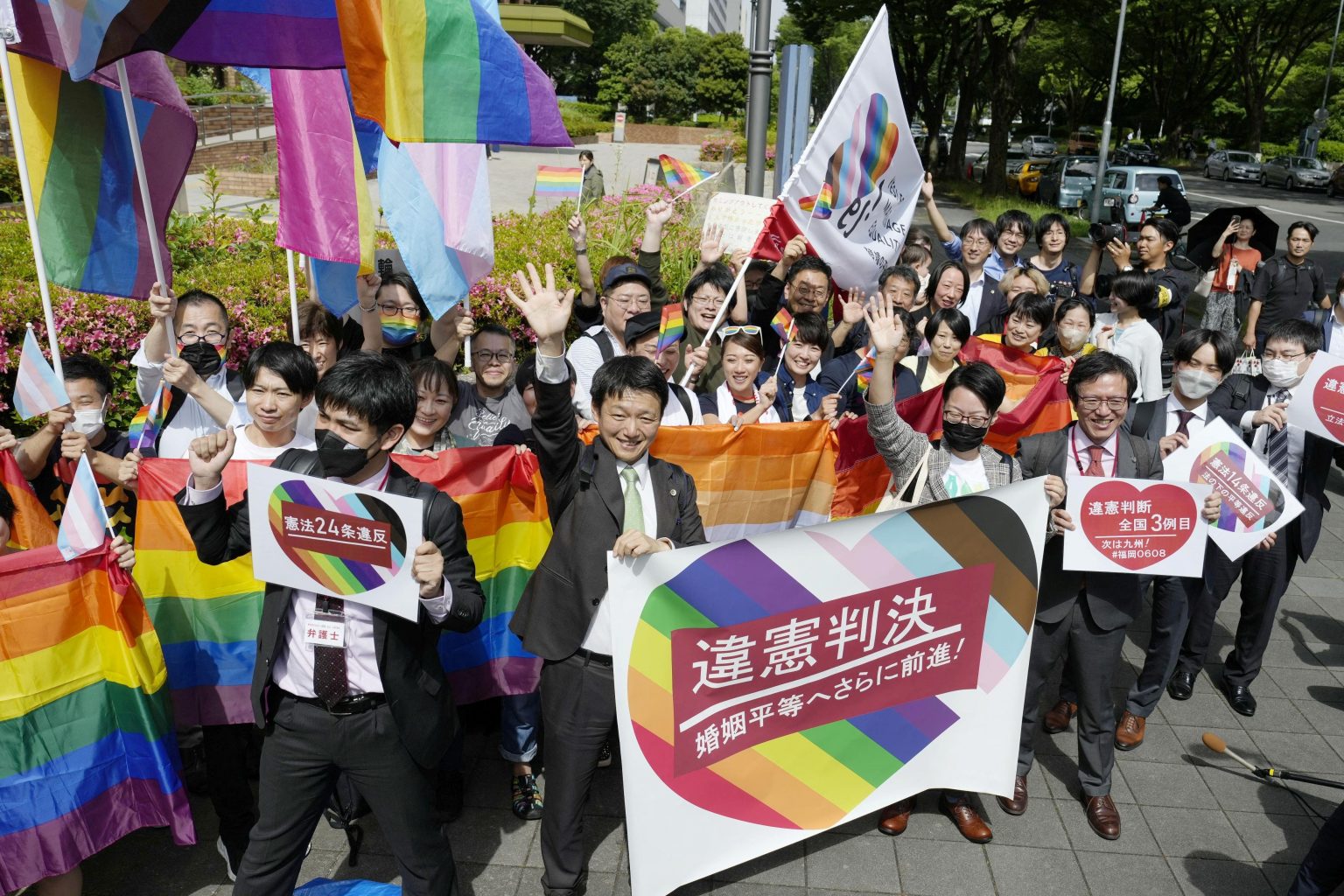
Japan’s Nagoya High Court on March 7 ruled the lack of legal recognition of same-sex marriages violates the country’s constitution.
The plaintiffs argued Japan’s Civil Code and Family Registration Act, which does not recognize same-sex marriages, violates the country’s constitution. They cited Article 14, Paragraph 1, which guarantees equality under the law and prohibits discrimination based on factors that include race, creed, sex, or social status. The plaintiff also invoked Article 24, Paragraph 2, which emphasizes that laws governing marriage and family matters must uphold individual dignity and the fundamental equality of the sexes.
The plaintiffs sought damages of 1 million yen ($6,721.80) under Article 1, Paragraph 1, of the State Redress Act, which provides for compensation when a public official, through intentional or negligent acts in the course of their duties, causes harm to another individual. The claim centered on the government’s failure to enact necessary legislation, which prevented the plaintiff from marrying.
The court noted same-sex relationships have existed naturally long before the establishment of legal marriage. It emphasized that recognizing such relationships as legitimate is a fundamental legal interest connected to personal dignity, transcending the confines of traditional legal frameworks governing marriage and family.
The court further observed same-sex couples encounter significant disadvantages in various aspects of social life that cannot be addressed through civil partnership systems. These include housing challenges, such as restrictions on renting properties, and financial institutions refusing to recognize same-sex couples as family members for mortgages. Same-sex couples also face hurdles in accessing products and services tailored to family relationships. While the court deemed the relevant provisions unconstitutional, it clarified that the government’s failure to enact legislative changes does not constitute a violation under the State Redress Act.
The lawsuit, titled “Freedom of Marriage for All,” brought together a large coalition of professionals, including more than 30 plaintiffs and 80 lawyers. They filed six lawsuits in five courts throughout Japan.
“We filed these lawsuits on Valentine’s Day, Feb. 14, 2019, in Tokyo, Osaka, Nagoya, and Sapporo, and in September of that year in Fukuoka,” noted Takeharu Kato, director of Marriage for All Japan. “Then, in March 2021, the Sapporo District Court handed down the first ruling declaring the current laws unconstitutional, which received extensive worldwide media coverage. Subsequently, the Osaka District Court unfortunately ruled that the current law is constitutional, but among the 10 rulings handed down so far, nine have ruled that not recognizing marriage equality is unconstitutional.”
Kato is a lawyer who is part of the legal team in the Sapporo case. He is also a board member of Marriage for All Japan, a marriage equality campaign.
“The MFAJ (Marriage for All Japan) is fully supporting the lawsuits by publicizing the current status of the trials and the rulings in our websites and social networks, setting up press conferences at the time of the rulings,” Kato told the Los Angeles Blade. “We also make the best of the impact of the lawsuits in our campaign by holding events with the plaintiffs of the lawsuits and inviting them to the rally at Diet (the Japanese parliament) members’ building.”
Kato said the campaign has significantly shifted public opinion, with recent polls indicating more than 70 percent of Japanese people now support marriage equality — up from approximately 40 percent before Marriage for All Japan launched. He also noted 49 percent of Diet members now back marriage equality.
Japan is the only G7 country that does not legally recognize same-sex couples. Taiwan, Nepal, and Thailand have extended full marriage rights to gays and lesbians.
Expressing disappointment, Kato said many Japanese politicians continue to resist marriage equality, despite overwhelming public support. Kato added Marriage for All Japan expects the Supreme Court to rule on their lawsuits in 2016.
“We believe that the Supreme Court will also rule that the current laws are unconstitutional,” he said. “However, the Supreme Court’s ruling alone is not enough to achieve marriage equality under the Japanese legal system. We should put more and more strong pressure on the Diet to legalize marriage equality in Japan as soon as possible.”
Several municipalities and prefectures issue certificates that provide limited benefits to same-sex couples, but they fall short of equal legal recognition.
Prime Minister Fumio Kishida’s government has faced mounting pressure on the issue as public support for marriage equality has surged in recent years. Kishida has yet to push reforms within his own party; encountering fierce opposition from its traditional leadership.
His government in June 2023 passed Japan’s first law addressing sexual orientation and gender identity, aiming to “promote understanding” and prevent “unfair discrimination.” Activists, however, widely criticized the legislation on grounds it fails to provide comprehensive protections or extend marriage rights to same-sex couples.
Chile
2024 was ‘year of regression’ for LGBTQ+ rights in Chile
Advocacy group blamed rise in ultra-right, government inaction

A report that a Chilean advocacy group released on Tuesday says 2024 was a “year of regression” for LGBTQ+ rights.
The Movement for Homosexual Integration and Liberation (Movilh)’s 23rd Sexual and Gender Diversity Human Rights report notes LGBTQ+ rights for the first time since democracy returned to Chile in 1990 not only stopped advancing, but saw significant rollbacks in the three branches of government.
The Movilh report describes 2024 as “the year of regression,” noting 23.5 percent of human rights violations against LGBTQ+ people over the last two decades occurred last year. A total of 2,847 discrimination complaints were reported in 2024, representing a 78.7 percent increase over the previous year.
The report documents two murders, 44 physical or verbal assaults, two incidents of violence in police stations, 89 reports of abuse in the workplace, and 65 incidents in educational institutions in 2024. The transgender community was particularly affected, with a 462.6 percent increase in discrimination cases compared to 2023.
The Movilh report notes the growing influence of the ultra-right, whose narratives have fostered hate speech, is one of the main factors behind the deterioration of LGBTQ+ rights in Chile. The advocacy group also criticizes authorities who have remained silent in the face of these attacks, even though they say they support the LGBTQ+ community.
The report specifically singles out the Executive Branch.
Movilh specifically highlights the prohibition of public funds for hormone treatments for trans minors and the postponement of these procedures in public hospitals. The government reversed course after intense pressure and judicial appeals.
The report also criticizes the judiciary.
The Oral Criminal Trial Court of San Antonio refused to classify the murder of a trans woman as a femicide, arguing her identity card still reflected the gender assigned to her at birth. The Court of Appeals of Santiago also ordered the removal of a homophobia complaint on social media, setting what NGOs have described as a dangerous freedom of speech precedent.

The report notes Valparaíso, Metropolitana, and Biobío are the three regions with the highest number of discrimination complaints, with 51.3 percent, 25.1 percent, and 5.8 percent respectively. Reported cases increased in 11 of Chile’s 16 regions, with Ñuble leading the way with a 300 percent increase.
Faced with this bleak panorama, advocacy groups have intensified their efforts to denounce the violence and demand LGBTQ+ rights are once again guaranteed. Movilh, along with other organizations, have approached the Inter-American Commission on Human Rights and the U.N. about the situation in Chile.
“We are seeing a reversal of rights that cost decades of struggle,” warns the report. “If the State does not act urgently, we run the risk of discrimination and violence becoming institutionalized.”
Kenya
Kenyan president defends Trump executive order on two genders
Advocacy groups criticized William Ruto’s Jan. 26 comments

Kenyan President William Ruto is facing backlash for backing U.S. President Donald Trump’s executive order that recognizes only two genders: Male and female.
Ruto’s support for Trump’s decision to ban transgender people from serving in the U.S. military and competing on women’s sports teams has drawn criticism from human rights defenders, lawmakers, lawyers, and intersex activists.
Ruto’s critics cite Kenya’s 2022 landmark decision to officially recognize intersex people as the third gender with an “I” gender marker after years of court battles for recognition and their inclusion in a national Census for the first time in 2019.
“We are very proud that contrary to what has been happening in the past, this year we got some very welcoming developments in the United States that as a leading democracy, we have gotten to understand that the policy direction of the U.S. supports what we believe in,” Ruto stated during a Jan. 26 speech at the Global Cathedral Church’s annual convention in Nairobi. “Boys must remain boys, men must remain men, women must remain women and girls must remain girls.”
Ruto’s position to side with Trump on sex and gender identity contradicts his previous stance during the Biden-Harris administration when he was cautious about speaking about transgender and queer rights in order not to jeopardize his relationship with Washington.
Trump on Jan. 21 signed an executive order that directed the U.S. federal government to only recognize male and female genders. This directive revoked the Biden-era policy that recognized trans rights and allowed trans servicemembers.
Trump on Feb. 6 signed another executive order that bans trans athletes from competing on female sports teams
“The war on women’s sports is over,” he said.
“We’re putting every school receiving taxpayer dollars on notice that if you let men take over women’s sports teams or invade your locker rooms, you will be investigated for violations of Title IX and risk your federal funding,” Trump warned. “From now on, women’s sports will be only for women.”
His executive order relies partly on the U.S. Justice Department’s authority to bring enforcement actions under Title IX, which bars sex discrimination in education and requires schools to offer girls an equal opportunity to play sports. The law, under Trump’s interpretation, forbids trans girls from playing in girls’ sports.
Trump in 2017 banned trans people from serving openly in the U.S. military.
“We thank God that this year the first very news from the U.S. in the new administration is to confirm what the Bible says, what our faith believes in, and what our tradition firmly is grounded on,” Ruto said in his speech.
The Kenya National Commission on Human Rights (KNCHR), a government-funded body, described Ruto’s comments as “embarrassing and unfortunate.”
“In Kenya, the law is very clear and the Children’s Act recognizes the intersex because they are unique persons as they have no issues based on sex identity or gender orientation,” said an intersex rights activist who asked the Washington Blade to remain anonymous. “His sentiments are likely to increase stigma against the intersex persons and if they are discriminated against, anyone will just go to court because they are also protected by the law.”
Esther Passaris, an opposition MP who represents Nairobi County, maintained there are not two sexes in Kenya.
“Let’s face it, we have intersex children with two or incomplete sexes. These children require our love as a society,” she said. “Let God deal with the genders.”
Since the recognition of intersex people, several policy measures to tackle discrimination have been implemented to ensure their protection and equal treatment.
Kenya last week officially recognized intersex people at birth, allowing them to receive birth certificates with an “I” gender marker. The KNCHR described this decision as “a historic milestone” that aligns with the Kenyan constitution and other existing policy measures that include the Children Act and the proposed Intersex Persons Bill, 2024.
“This is a major step towards securing rights, dignity, and equal opportunities for all intersex persons in Kenya,” KNCHR stated.
KNCHR asked Kenyans, state, and non-state institutions to support awareness, policy reforms, and the inclusion of intersex people for the latest reform to be implemented successfully.
World
Suspension of US aid is ‘catastrophe’ for global LGBTQ+ rights movement
Washington funds third of international advocacy

The Trump-Vance administration’s decision to freeze nearly all U.S. foreign aid spending for at least 90 days has had a devastating impact on the global LGBTQ+ rights movement.
The Institute on Race, Equality and Human Rights, a Washington-based group that championed LGBTQ+ and intersex rights in Brazil and elsewhere in Latin America, on Feb. 1 announced it has suspended programming because it lost nearly 80 percent of its funding.
“Despite some limitations we are facing at the moment, we want to share that our commitment is unwavering,” said the organization in an email it sent to supporters on Wednesday. The message also asked them to make a donation.
Outright International, a global LGBTQ+ and intersex advocacy group, in a statement to the Los Angeles Blade said it has “had to halt direct funding and capacity-building support to LGBTIQ groups in more than 32 countries” in Africa, Asia, the Caribbean, and Latin America.
“The community-based groups we support with USAID (the U.S. Agency for International Development) funding carry out critical human rights, humanitarian and development work,” said Outright International. “This includes protecting community members from violence, providing skills training that allows LGBTIQ people to access employment and entrepreneurial opportunities, and essential services, including healthcare services.”
The LGBTQ+ Victory Institute works with Caribe Afirmativo in Colombia, Promsex in Peru, VoteLGBT in Brazil, and a number of other advocacy groups outside the U.S. LGBTQ+ Victory Institute President Elliot Imse told the Blade his organization has lost around $600,000, which is two-thirds of its entire global program budget.
“We’re scrambling to secure new funding to restore half of the amount we lost, which would allow us to make a similar impact on LGBTQ inclusion worldwide,” he said.
Equal Namibia and Namibia Pride received a $30,000 grant from USAID. Omar van Reenen, co-founder of Equal Namibia, told the Washington Blade it “was the largest grant and biggest grant on such a scale we have received.
“When we received this grant it was the first time we had substantial funding for our organization,” they said.
Van Reenen said the organizations have lost $10,000 of the original $30,000 they received from USAID.
“This means we do are back to zero funds for the organization and will need to continue our campaigns on a voluntary basis,” they told the Blade. “This comes at the worst time as we will need to challenge the new anti-same-sex marriage act passed by the president in October and the upcoming decriminalization case which the Supreme Court will hear soon.”
The Center for Integrated Training and Research, a group known by the Spanish acronym COIN that fights the HIV/AIDS epidemic in the Dominican Republic and in other countries in the Caribbean, on Feb. 6 said the funding freeze “directly affects the continuity of the free services that COIN provides to more than 2,300 patients who receive antiretroviral treatment” in the Dominican Republic.
COIN said its patients will continue to receive free antiretroviral drugs because the Dominican government provides them; but the funding freeze has forced it to suspend urology, internal medicine, and pediatric services. COIN said it will continue to provide vaccines and general medicine, gynecological, and family planning services, but “with limitations.” COIN also noted its PrEP service will continue, “but with reduced capacity.”
“In light of this situation, we urgently call upon the national and international community, strategic allies, and sectors sensitive to our cause to find solutions that allow us to continue offering these vital services,” said COIN. “The health and well-being of thousands of people depends on the solidarity and commitment of everyone.”
Secretary of State Marco Rubio on Jan. 24 directed State Department personnel to stop nearly all U.S. foreign aid spending for 90 days in response to an executive order that President Donald Trump signed after his inauguration. Rubio later issued a waiver that allows the President’s Emergency Plan for AIDS Relief and other “life-saving humanitarian assistance” programs to continue to operate during the freeze. (The Blade last week reported PEPFAR-funded programs in Kenya and other African countries have been forced to suspend services and even shut down because of a lack of U.S. funding. Dozens of HIV/AIDS activists on Feb. 6 protested outside the State Department and demanded U.S. officials fully restore PEPFAR funding.)
The Trump-Vance administration is also trying to dismantle USAID.
A statement the White House issued on Feb. 3 said the organization “has been unaccountable to taxpayers as it funnels massive sums of money to the ridiculous — and, in many cases, malicious — pet projects of entrenched bureaucrats, with next-to-no oversight.” The statement also contains examples of what it described as “the waste and abuse” that include:
• $1.5 million to “advance diversity equity and inclusion in Serbia’s workplaces and business communities”
• $47,000 for a “transgender opera” in Colombia
• $32,000 for a “transgender comic book” in Peru
• $2 million for sex changes and “LGBT activism” in Guatemala
The statement links to an article the Daily Mail published on Jan. 31 that President Donald Trump “strips millions from DEI foreign aid programs funding Irish musicals, LGBTQ programs in Serbia and more.” The claim that USAID paid for “sex changes and ‘LGBT activism’ in Guatemala” appears to come from an article the Daily Caller published on Sept. 19, 2024.
Sources with whom the Blade has spoken say the White House’s claims are incorrect.
Salvadoran President Nayib Bukele on Feb. 2 welcomed efforts to dismantle USAID.
“Most governments don’t want USAID funds flowing into their countries because they understand where much of that money actually ends up,” he wrote on X. “While marketed as support for development, democracy, and human rights, the majority of these funds are funneled into opposition groups, NGOs with political agendas, and destabilizing movements.”
Most governments don’t want USAID funds flowing into their countries because they understand where much of that money actually ends up.
While marketed as support for development, democracy, and human rights, the majority of these funds are funneled into opposition groups, NGOs… pic.twitter.com/bXpdK29zH5
— Nayib Bukele (@nayibbukele) February 2, 2025
Mónica Hernández, executive director of ASPIDH Arcoíris Trans, a transgender rights group in El Salvador, spoke with the Blade last week in San Salvador, the country’s capital. Posters with USAID’s logo were on the wall inside the organization’s office.
Hernández said she learned on Jan. 27 the U.S. had suspended funding that ASPIDH Arcoíris Trans received through Freedom House and other groups that partnered with the State Department. She told the Blade that Washington cancelled the grants the following day.
“The (challenge) is to look for other funds from another institution that is not USAID, or that is not from the United States that has to go through the State Department,” she said.

Outright International told the Blade that USAID is not it’s “only source of funding,” but noted “USAID, and the U.S. government more broadly, have in recent years become an extremely important source of funding for LGBTIQ rights around the world, allowing us and our partners to expand our efforts to promote inclusive development and combat pervasive human rights violations.”
Council for Global Equality Chair Mark Bromley told the Blade the U.S. funds roughly a third of the global LGBTQ+ rights movement. Imse said the global LGBTQ rights movement is set to lose more than $50 million.
“It is a catastrophe,” he told the Blade.
Bromley added it will be “challenging, if not impossible” to fill the funding gap.
“There isn’t a short term way to fill the current funding gap,” he said. “It sets the movement back at least 10 years.”
Mexico
Trump executive orders leave LGBTQ+ migrants, asylum seekers in limbo
Suspension of US foreign aid may force shelters to close

MEXICALI, Mexico — Marlon, a 35-year-old man from Guatemala, used the CBP (U.S. Customs and Border Protection) One app to schedule an appointment that would have allowed him to enter the U.S. at a port of entry.
His CBP One appointment was at 1 p.m. PT (4 p.m. ET) on Jan. 21 in the Mexican city of Tijuana that borders San Diego. Marlon at around 11 a.m. PT (2 p.m. ET) on Jan. 20 learned his appointment had been cancelled.
President Donald Trump took office less than two hours earlier.
“We’re stuck,” Marlon told the Los Angeles Blade on Jan. 31 during an interview at Posada del Migrante, a migrant shelter in the Mexican border city of Mexicali that Centro Comunitario de Bienestar (COBINA), a group that serves LGBTQ+ people and other vulnerable groups, runs.

The Trump-Vance administration’s immigration policies have left Marlon and many other migrants and asylum seekers — LGBTQ+ and otherwise — in limbo.
Daniela is a 20-year-old transgender woman from Tijuana who has lived at Jardín de las Mariposas, a shelter for LGBTQ+ migrants and asylum seekers in the city’s Obrera neighborhood, for a month. Jardín de las Mariposas is roughly six miles south of the Mexico-U.S. border.
She told the Blade on Jan. 29 during an interview that she was raped in Hermosillo, the capital of Mexico’s Sonora state, four months ago. Daniela said her roommate and five other people later tried to kill her when they “were drunk and on drugs.”
Daniela, like Marlon, had a CBP One appointment, but it was cancelled once Trump took office.
“I am completely alone both in Tijuana and elsewhere,” said Daniela. “I think the United States is a better option to be able to start over.”
Stephanie, a 25-year-old from El Paraíso, Honduras who identifies as a lesbian, arrived in Tijuana last July and lives at Jardín de las Mariposas.
She told the Blade her family is “very religious,” and she is the “only one in my family who is a member of the (LGBTQ+) community.” Stephanie said a cousin in Louisiana agreed to allow her to live with her once she entered in the U.S., but she refused once she saw she had cut her hair.
“I felt a bit of freedom once I arrived here in Mexico … and I decided to cut my hair because it was very long,” recalled Stephanie. “One day she did a video call and she saw my short hair and she was like I cannot receive you; I cannot receive you because what example are you going to be to my son.”
Trump, in addition to shutting down the CBP One app on Jan. 20, issued several immigration-specific executive orders after his inauguration. They include:
• Declaring a national emergency on the Southern border
• Suspending the U.S. Refugee Admissions Program
• Ending birthright citizenship under the 14th amendment. (U.S. District Judge John Coughenour, who Ronald Reagan appointed, in a Jan. 23 ruling that temporarily blocked the directive described it as “blatantly unconstitutional.”)
Trump has reinstated the Migrant Protection Protocols program, also known as the “Remain in Mexico” policy that forced asylum seekers to pursue their cases in Mexico.
State Department spokesperson Tammy Bruce on Tuesday said Salvadoran President Nayib Bukele during his meeting with Secretary of State Marco Rubio “agreed to take back all Salvadoran MS-13 gang members who are in the United States unlawfully,” and “promised to accept and incarcerate violent illegal immigrants, including members of the Venezuelan Tren de Aragua gang, but also criminal illegal migrants from any country.” The Department of Homeland Security in a press release notes Tren de Aragua members were on the first U.S. military “flight of criminal aliens” that arrived at the Guantanamo Bay Naval Base in Cuba on Tuesday.
Jardín de Las Mariposas Director Jamie Marín on Jan. 29 told the Blade that Trump’s policies have sparked “a lot of fear.”
She said some of the shelter’s residents who had their CBP One appointments cancelled have either returned to their countries of origin or have found another way to enter the U.S., including with the help of smugglers who are known as “coyotes” in Mexican Spanish. Marín said Jardín de las Mariposas is working with those who have decided to stay in Tijuana to help them secure identity documents and employment.
“Our goal was to be a temporary shelter to move to the United States,” she told the Blade. “Now it’s almost becoming like we’re going to become a permanent shelter until we find another solution for them.”

Susy Barrales is president of Casita de Unión Trans, a trans support group that she founded in Tijuana in 2019 after she was deported from the U.S.
She told the Blade during a Jan. 30 interview at her office, which is a few blocks from the border, that two migrants who the U.S. deported arrived at Casa de Unión Trans the day before without medications. Barrales, like Marín, said the Trump’s immigration policies have sparked concern in Tijuana.
“He is doing this political campaign,” said Barrales in response to the Blade’s question about Trump’s policies. “I think it is something political, a political strategy that he wants to do, as a way to slow down immigration. This is why he makes these types of racist comments against migrants and against the community.”
Situation along Mexico-US border is ‘tense’
The Trump-Vance administration’s decision to suspend nearly all U.S. foreign aid spending for at least 90 days has had a direct impact on Mexican organizations that serve LGBTQ+ migrants and asylum seekers.
Casa Frida works with upwards of 300 LGBTQ+ asylum seekers and migrants in Mexico City and in the cities of Monterrey and Tapachula. Sixty percent of Casa Frida’s annual budget comes from U.S. government grants — specifically from the U.S. Agency for International Development, the State Department, and its Office to Monitor and Combat Trafficking in Persons.
Casa Frida Director Raúl Caporal on Monday told the Blade the U.S. on Jan. 24 suspended funding for five of his organization’s initiatives.
A poster inside COBINA’s offices on Jan. 31 contained a QR code that brought migrants to a WhatsApp page that had information about how they could “migrate informed and legally.” The State Department partnered with Partners of the Americas, a Washington-based NGO, on the initiative.
Maky Pollorena, a Mexicali-based activist who volunteers with COBINA, told the Blade the WhatsApp page stopped providing information on Jan. 24. Pollorena also said COBINA and the majority of migrant shelters in Mexico’s Baja California state of which Mexicali is the capital have lost between 50 and 70 percent of their funding.
“All of us who are in Baja California’s border strip are tense,” said COBINA President Altagracia Tamayo.

Marín noted Jardín de las Mariposas’ funding does not come from the U.S. government, but rather from the Transgender Law Center and other NGOs that include AIDS Healthcare Foundation. Baja California Gov. Marina del Pilar Ávila’s administration donated the building in which Jardín de las Mariposas is located. The International Organization for Migration, the U.N. High Commissioner for Refugees, and the Organization for Refuge, Asylum and Migration are also support Jardín de las Mariposas.
Despite this lack of dependence upon U.S. government funding, Marín said the Trump-Vance administration’s policies could prove deadly.
“These decisions from the Trump administration are going to cost a lot of lives for the LGBT community, not only here,” she said. “It’s also going to cost a lot of lives in the United States.”
Mexico
Mexican group that serves LGBTQ+ migrants may close without US funding
60 percent of Casa Frida’s annual budget comes from Washington

Editor’s note: International News Editor Michael K. Lavers is on assignment in Mexico to cover the impact that President Donald Trump’s immigration policies are having on LGBTQ+ migrants and asylum seekers.
MEXICO CITY — The Trump-Vance administration’s decision to freeze nearly all U.S. foreign aid spending for at least 90 days could force a Mexican organization that serves LGBTQ+ migrants and asylum seekers to close.
Casa Frida works with upwards of 300 LGBTQ+ asylum seekers and migrants in Mexico City and in the cities of Monterrey and Tapachula.
Casa Frida Director Raúl Caporal on Monday told the Los Angeles Blade during an interview at his Mexico City office that 60 percent of his organization’s annual budget comes from U.S. government grants — specifically from the U.S. Agency for International Development, the State Department, and its Office to Monitor and Combat Trafficking in Persons.
Caporal said the U.S. on Jan. 24 suspended funding for five Casa Frida initiatives that specifically focused on “organizational strengthening, humanitarian assistance, financial inclusion, digital security” and fighting human trafficking.
Secretary of State Marco Rubio on the same day directed State Department personnel to stop nearly all U.S. foreign aid spending for 90 days in response to an executive order that Trump signed on Jan. 20. Rubio last week issued a waiver that allows the President’s Emergency Plan for AIDS Relief and other “life-saving humanitarian assistance” programs to continue to operate during the funding freeze.
“All of these (Casa Frida) services are now extremely limited and compromised because the suspension was immediate,” Caporal told the Blade.
He said Casa Frida has already laid off several staffers. Caporal also told the Blade the U.S. funds that remain in Casa Frida’s bank account may have to be returned to Washington.
“That implies many problems,” said Caporal. “It’s not only the continuity of our services, but it also puts the organization’s future at risk.”
Casa Frida has already laid off several staffers. Caporal told the Blade that he and his colleagues are working with the European Union, foreign governments, local officials, and private donors to find additional funding sources.

The waiver that Rubio issued notes it does not apply to “activities that involve abortions, family planning conferences” and “gender or DEI ideology programs, transgender surgeries, or other non-life saving assistance.”
Caporal said there is a chance the White House could extend the funding freeze in order to “review which international cooperation projects align or coincide with the current administration’s political interests.”
“We are quite certain that much of this aid is going to return,” he said. “But (Trump) since the campaign has made it very clear that nothing, not a single dollar for the LGBT community, or for sexual rights, reproductive rights, women, migrants.”
“It is therefore very possible that projects that have more to do with eliminating inequality gaps, poverty, urban development, etc., will return,” added Caporal. “But we are not waiting for these projects to be reactivated.”
Casa Frida is among the global LGBTQ+ organizations dependent upon U.S. support that have been left scrambling. The Blade is in touch with several of them that may have to curtail programming or even close if they cannot secure alternate funding sources.
The Blade will update this story.
Argentina
Millions march against Javier Milei in Argentina
Protests took place after president’s comments at World Economic Forum

Millions of people in Buenos Aires and across Argentina participated in marches against President Javier Milei in response to his controversial comments at the World Economic Forum in Davos, Switzerland.
The Buenos Aires march, led by LGBTQ+, women’s and human rights organizations in Argentina, shaped up to be one of the largest demonstrations against Milei since he became president in December 2023. The mobilization is a direct response to Milei’s disparaging comments about feminism, LGBTQ+ rights, and other progressive movements.
Milei called “wokism” and “gender ideology” harmful during his Jan. 23 speech at the World Economic Forum, even comparing them to pedophilia. These statements sparked outrage across Argentina with protesters demanding the defense of human rights and equality.
María Rachid, president of the Argentine LGBT+ Federation, told the Los Angeles Blade on Sunday “the march was massive, a strong message to President Milei putting a limit to hatred, discrimination and violence.”
“Argentine society built the values of respect for diversity, equality, and true freedom and yesterday it came out to defend them with massive demonstrations throughout the country and in many cities around the world,” said Rachid. “We are proud of what we were able to build because although they want to destroy it, it is already part of the heart of Argentine society.”
The Buenos Aires march began at the National Congress and ended at the Casa Rosada, the seat of the country’s presidency. Thousands of demonstrators, many with rainbow flags and banners that read “rights are not negotiable,” expressed their strong rejection of Milei’s policies.
Gay Congressman Esteban Paulón highlighted to the Blade “the call for the march was impressive.”
“I think it exceeded any forecast, not only because of the massiveness in the City of Buenos Aires, where it is estimated more than a million people, but also because of the massiveness in the 150 cities in which it was held throughout the country,” he said. “The truth is that it was a very, very big march in Rosario, in Córdoba, in Santa Fe, in Mar del Plata, in Bariloche, in the north, in Salta.”
“There was no expectation that it would be so, so massive, beyond the one in Buenos Aires, which had had an important call, an important visibility, which had added several actors,” added Paulón.

Sofía Díaz, a transgender woman who worked as a civil servant before Milei’s administration fired her, marched in Corrientes, a city in Chaco province.
“After President Milei’s speeches in Davos, the next day we started texting each other on WhatsApp,” she said, referring to public employees at the national level. “We were really afraid of what he had said.”
Activists around the world expressed solidarity with their Argentine counterparts.
Marches took place in cities around the world — including in Santiago, Chile; Montevideo, Uruguay; Rio de Janeiro; São Paulo; Mexico City; London; Madrid; Amsterdam; Berlin; Geneva; Paris; New York; Lisbon, Portugal; and the Spanish cities of Barcelona and Granada.
The Movement for Homosexual Integration and Liberation, a Chilean LGBTQ+ rights group, on Feb. 1 organized a march to the Argentine Embassy. Activists delivered a letter that expressed solidarity with the LGBTQ+ community and repudiated Milei’s policies against it.
Mexico
VIDEO: Blade visits Mexico-US border
Trump policies put LGBTQ+ migrants, asylum seekers at risk

TIJUANA, Mexico — The Los Angeles Blade on Jan. 29 visited the Mexico-U.S. border in the Mexican border city of Tijuana.
(Washington Blade video by Michael K. Lavers)
The Blade since Jan. 28 has been on assignment in Mexico to cover the impact that President Donald Trump’s immigration policies are having on LGBTQ+ migrants and asylum seekers. The Blade will remain on assignment in the country and in El Salvador through Feb. 8.
World
Blade returns to Mexico-U.S. border
Trump’s immigration policy putting LGBTQ+ migrants, asylum seekers at risk
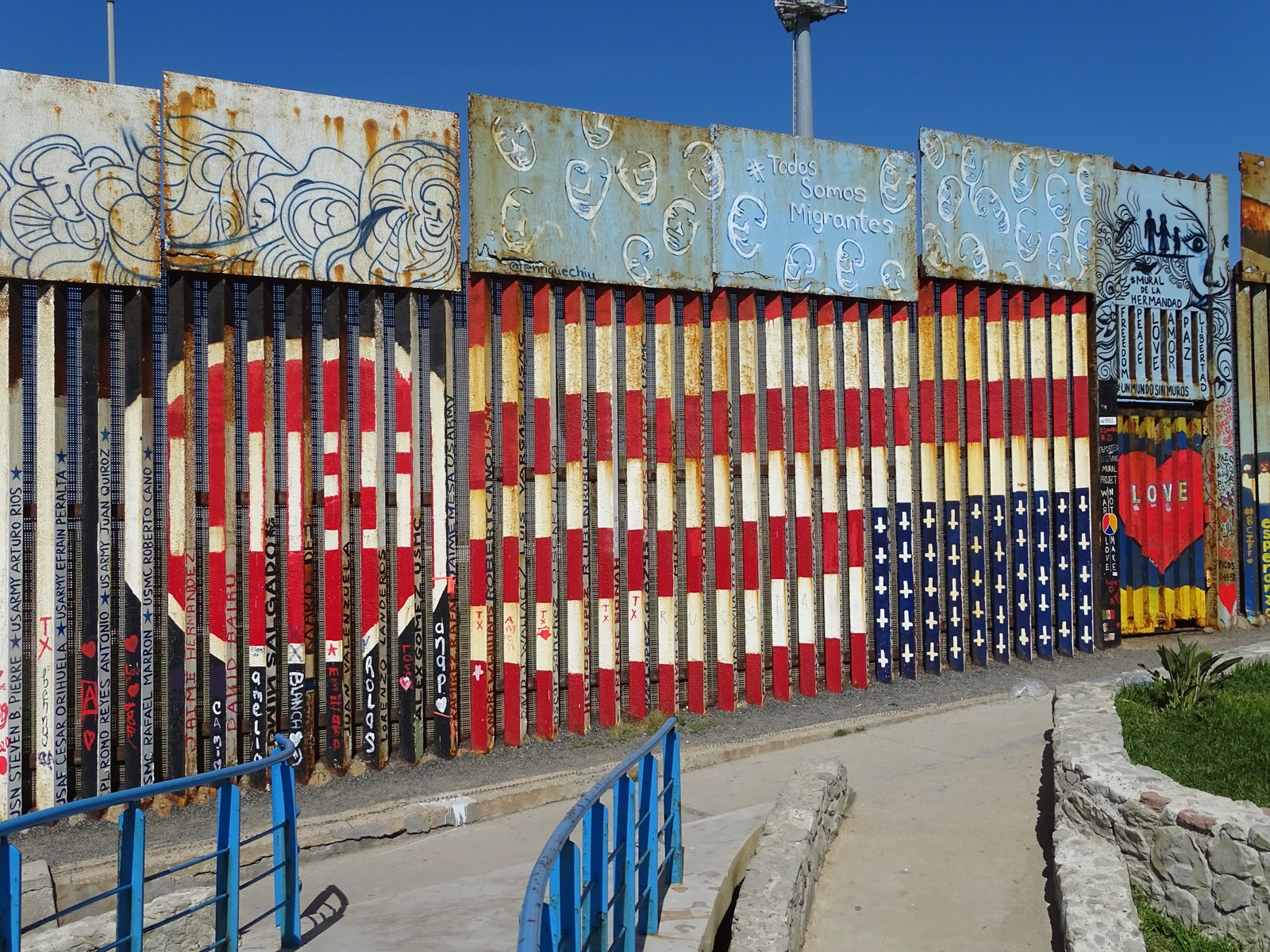
Washington Blade International News Editor Michael K. Lavers will be on assignment in Mexico and El Salvador through Feb. 8 to cover the impact of President Donald Trump’s immigration policy on LGBTQ+ migrants and asylum seekers.
Lavers will report from Tijuana and Mexicali, two Mexican cities that border the U.S. He will also be in Mexico City and San Salvador, the Salvadoran capital, before returning to D.C.
The Blade reported from the Mexico-U.S. border and from El Salvador and other Central American countries — Guatemala, Honduras, Nicaragua, Costa Rica, and Panama — several times during the first Trump administration. Lavers also traveled to the region during the Biden-Harris administration.
“The second Trump administration’s immigration policies have had immediate consequences along the Mexico-U.S. border and elsewhere in the region,” said Lavers. “It is critically important for the Washington Blade to continue its coverage of U.S. immigration policy and its impact on LGBTQ+ migrants and asylum seekers who are seeking a better life for themselves and their families.”
Lavers’s reporting can be found on the Blade’s website.
“This reporting trip highlights the Blade’s ongoing commitment to enterprise journalism,” said Blade Editor Kevin Naff. “It’s imperative that reporters are in the field, telling these important stories. We know that the LGBTQ community will be disproportionately impacted by the Trump administration’s anti-immigrant crackdown.”
-

 Obituary2 days ago
Obituary2 days agoNanette Kazaoka, an unlikely AIDS activist, dies at 83
-

 News4 days ago
News4 days agoHere are 3 events to celebrate Trans Day of Visibility
-

 Arts & Entertainment5 days ago
Arts & Entertainment5 days agoWin your tickets to Margaret Cho at The Grammy Museum for one rare night!
-

 India5 days ago
India5 days agoLGBTQ+ poets included in India’s premier literary festival
-

 Television3 days ago
Television3 days agoNo, ‘Mid-Century Modern’ is not a ‘Golden Girls’ remake

